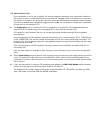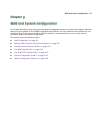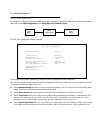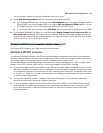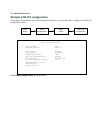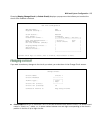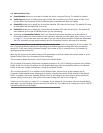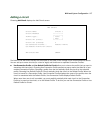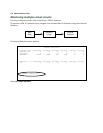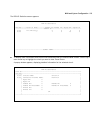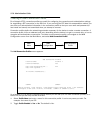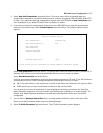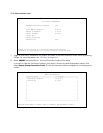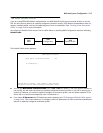
9-6 Administration Guide
■ Circuit Enabled allows you to enable or disable the circuit, using the Tab key. The default is enabled.
■ Traffic Type allows you to select which type of traffic will be routed on this circuit, Voice or Data. If you
choose Voice, the Connection Profile is field becomes unavailable and does not display.
■ Circuit VPI allows you to specify the Virtual Path Identifier (VPI) value for the circuit. The default VPI value
for both ADSL and cell-based DSL is zero (0).
■ Circuit VCI allows you to specify the Virtual Channel Identifier (VCI) value for the circuit. The default VCI
value depends on the type of DSLAM to which you are connecting.
■ Accessing the Connection Profile Is field in the Change Circuit menu depends not on the number of
Connection Profiles you have created, but the number of data VCs you have added. (See “Adding a circuit”
on page 9-7.) If you have more than one data VC you can choose how Connection Profiles are associated
with VCs, otherwise you get default behavior and the Connection Profile Is field cannot be selected.
Note: With multiple VCs you must explicitly statically bind the second (and all subsequent) VCs to a profile. The
first VC will automatically statically bind according to pre-defined dynamic binding rules when you add the
second VC. It will revert back to dynamic binding if the number of VCs is reduced to one; for example, by
deleting previously defined VCs.
When the link comes up the device binds the VC dynamically to the first suitable Connection Profile or to the
Default Profile if there is no Connection Profile configured.
• If you factory default the device, the VC binds to the Default Profile.
• If you delete a Connection Profile that is statically bound to a VC, the VC binding is set back to the Default
Profile. If there is only one VC defined, the VC dynamically binds to the first suitable profile or to the Default
Profile. If there are multiple VCs defined, it binds to the Default Profile.
• If you add a second VC, it is initialized to the Default Profile, and the menu screens display the VC
Connection Profile-related items, allowing you to bind to a specific Connection Profile instead of the Default
Profile. In addition, the device statically binds the first VC according to the rules used to select a profile for
dynamic binding. At this point, each profile uses static binding when the link is brought up.
If there are no VCs when you add a VC -- for example, if you deleted all your previous VCs and started adding
them again -- dynamic binding will occur when the link comes up. If you delete a VC, leaving only one VC, that VC
resumes dynamically binding again.



